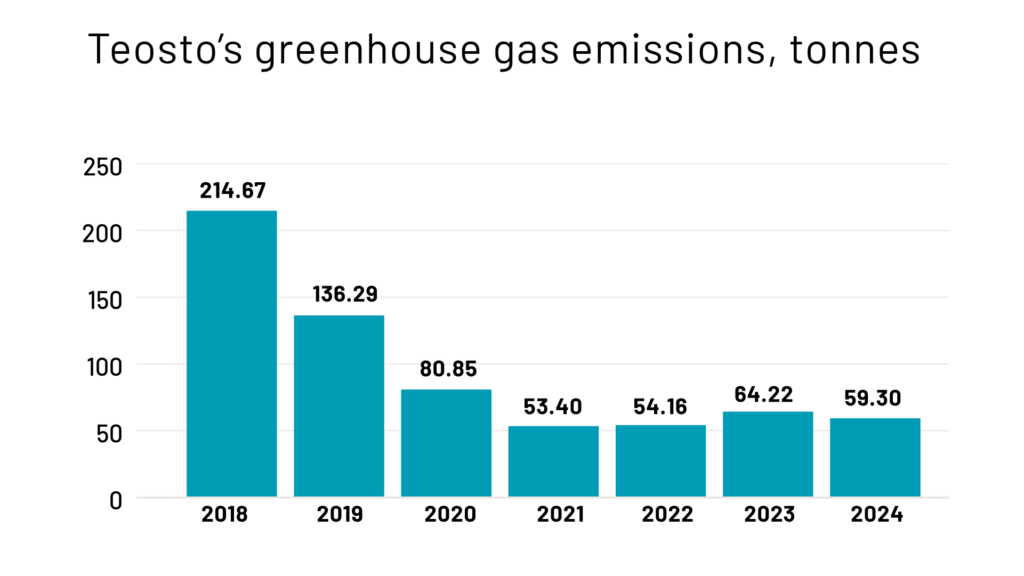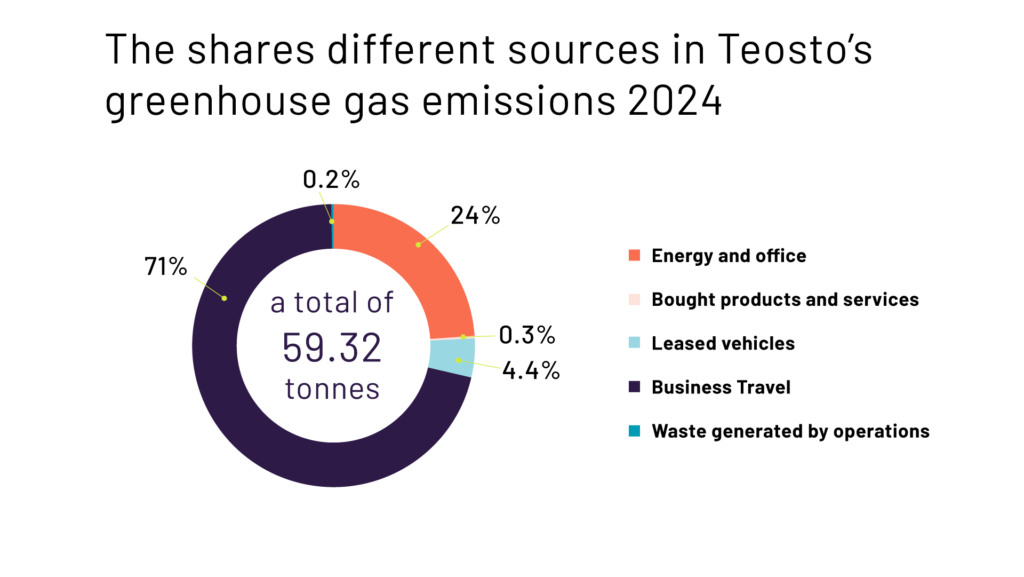
Environmental values play an important role in Teosto’s operations, and our goal is to become a carbon-neutral organisation. We track the carbon footprint of our operations and offset the annual carbon dioxide emissions they cause.
e strive to prevent and reduce the harmful impact of our operations on the environment and promote the sustainable use of natural resources.
We cooperate broadly with the entire industry to promote the adoption of environmentally friendly ways of working in the music industry. We are part of the Finnish KEMUT network, the goal of which is to foster sustainable development in the music industry. We are committed to the live music climate roadmap, compiled by the network.
Our carbon dioxide emissions have fallen to a quarter of the amount in 2018, which is when we started measuring our emissions.

Use and recycling of materials
We have held a WWF Green Office certificate for more than 10 years. The goal-oriented and measurable Green Office activities reduce the environmental impacts caused by the workplace. We take the recommendations of the Green Office system into account in all of our purchases as well as our fixtures and fittings. We take care of recycling all the waste types generated by our operations at our premises (plastic, cardboard, paper, biowaste, glass, metal, hazardous waste).
Our premises in Keilaniemi, Espoo, have been awarded BREEAM In-Use certificates. BREEAM In-Use is an international environmental certification system that includes categories related to health and well-being, energy, water, mobility, resources and waste management, land use and preparing for climate change. Our premises were rated Excellent, which is the second-highest rating.
Energy efficiency
Improving energy efficiency reduces energy consumption, which directly leads to lower emissions if the energy is produced from fossil fuels. We strive to improve our energy efficiency in everything we do, i.e. to take our carbon footprint into account and generate as little emissions as possible.
This means that we only travel when it is absolutely necessary, use green electricity in our property, and opt for vegetarian and local food at our events. Teosto’s company car policy only allows fully electric cars.
A significant proportion of Teosto’s carbon dioxide emissions have previously been generated by the energy consumption of properties. Over the years, the amount of space we use has decreased significantly, which has also helped to reduce emissions. Our property has excellent transport links (metro) and its parking facilities have charging points for electric cars. This promotes environmentally friendly mobility.
In connection with the BREEAM In-Use certification, our Port of Music property was praised for its energy-saving lighting solutions and its energy-efficient lifts, among other things. Users also have the opportunity to adjust the lighting and the temperature. In addition, all the plumbing fixtures use very little water. As a result of all this, our energy consumption decreased by a further 7% year-on-year.
Emissions and their reduction
Teosto wants to be a carbon-neutral organisation. We have tracked our carbon footprint and offset our emissions since 2017. Our tracking covers the carbon footprint of things like business travel, the energy we consume, waste, company cars and commuting as well as the food served at our events.
In 2024, our total carbon footprint was 59.34 tonnes (2023: 64.2 tonnes). All except for one of Teosto’s company cars were replaced by fully electric cars in accordance with our company car policy. This significantly reduced our carbon footprint. On the other hand, the carbon footprint of business travel increased as several international development projects, such as the upgrade of the distribution and reporting system and the work register system, required more international travel than before. In addition, increasing royalties from abroad in line with our strategy required closer international cooperation than before.
In 2024, our largest amount of emissions by far was due to business travel: 42.2 tonnes (2023: 32.8 tonnes). Our next largest amount of emissions was from energy.
In addition to travel, our largest amount of emissions was from energy, i.e. electricity consumption and heating, totalling about 14.2 tonnes (2023: 15.2 tonnes). Emissions from leased vehicles only amounted to 2.6 tonnes (2023: 15.9 tonnes).

Although the goal is to reduce our carbon footprint every year, not all emissions – such as the carbon burden caused by air travel in an international industry – can be completely prevented. For this reason, we offset our carbon footprint by taking part in a WWF Gold Standard-certified project every year. Emission offsetting refers to cancelling out the negative climate impact of the emissions by reducing or sequestering an equal amount of emissions elsewhere. The Gold Standard certification ensures that the climate impact and sustainability benefits are verified according to an internationally recognised standard.
In 2024, we offset our carbon footprint by supporting the Efficient and Clean Cooking Stoves for Households in Kenya climate project, which provides energy-efficient and cleaner cooking solutions for Kenyan households. The project reduces the use of wood and other solid fuels, which slows down deforestation, reduces carbon dioxide emissions and improves air quality. Learn more about the project.